The University Record, April 15, 1997
Humanities Institute names 11 fellows
The Institute for the Humanities has awarded fellowships to six faculty and five graduate students to work at the Institute during 1997-98. Their projects are connected to the Institute’s theme for the year, “Narrative.”
Interim Director Diane Kirkpatrick, who chaired both selection committees, emphasizes the excellence of those applying: “The rich array of original and creative projects was exciting. We are grateful to our Executive Committee—and to the three outside evaluators who faced an exceptionally difficult selection process in the Faculty competition: Carol Neely (English and women’s studies, University of Illinois, Champaign-Urbana), Clif ton Olds (art, Bowdoin College), and Robert Sullivan (church history, St. John’s Seminary). Thanks must also go to the graduate student selection committee: Sue Alcock (classics), Rosamund Bartlett (Slavic), and Richard Candida Smith (history).”
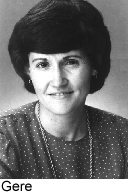 Anne Ruggles Gere (professor, English and education) will write The Education of the Woman of King Salmon, a record of a mother’s and her adopted daughter’s complicated negotiations over race, disability and sch ooling, both formal and extracurricular. She will probe the interrelations between verbal and visual languages as she seeks new narrative representations of social models of disability—models animated by an ethic of care and interdependence. Gere will hold the Steelcase Research Professorship.
Anne Ruggles Gere (professor, English and education) will write The Education of the Woman of King Salmon, a record of a mother’s and her adopted daughter’s complicated negotiations over race, disability and sch ooling, both formal and extracurricular. She will probe the interrelations between verbal and visual languages as she seeks new narrative representations of social models of disability—models animated by an ethic of care and interdependence. Gere will hold the Steelcase Research Professorship.
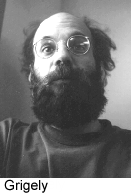 Joseph Grigely (associate professor, School of Art and Design), an artist and author, will be the John Rich Faculty Fellow. His project, “From Fragments to Stories: The Use of Conversational Fragments in Contemporary Art,” will yield an extensive body of work for a series of exhibitions in Istanbul, London, Dublin, Liverpool and Detroit. A gifted talker although profoundly deaf, Grigely makes conversation with hearing people by speaking; they reply by writing him little notes on whatever is handy. These hoarded notes, these “shards” of conversations, form the raw material of his art.
Joseph Grigely (associate professor, School of Art and Design), an artist and author, will be the John Rich Faculty Fellow. His project, “From Fragments to Stories: The Use of Conversational Fragments in Contemporary Art,” will yield an extensive body of work for a series of exhibitions in Istanbul, London, Dublin, Liverpool and Detroit. A gifted talker although profoundly deaf, Grigely makes conversation with hearing people by speaking; they reply by writing him little notes on whatever is handy. These hoarded notes, these “shards” of conversations, form the raw material of his art.
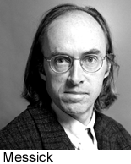 Brinkley Messick (associate professor, anthropology) will work on “Legal Narratives from Islamic Courts.” Messick has gathered case records of sharia litigation from an agrarian-based Islamic s tate that existed in highland Yemen until 1962. All sharia litigation comprises two principal—and opposed—stories concerning the facts capped by a third: that of the judge. “False testimonies, of course, required far greater narrative c reativity,” notes Messick, who will be the A. Bartlett Giamatti Faculty Fellow.
Brinkley Messick (associate professor, anthropology) will work on “Legal Narratives from Islamic Courts.” Messick has gathered case records of sharia litigation from an agrarian-based Islamic s tate that existed in highland Yemen until 1962. All sharia litigation comprises two principal—and opposed—stories concerning the facts capped by a third: that of the judge. “False testimonies, of course, required far greater narrative c reativity,” notes Messick, who will be the A. Bartlett Giamatti Faculty Fellow.
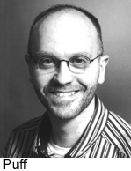 Helmut Puff (assistant professor, Germanic languages and literatures/history) will be working on “Narrating the Unspeakable: Representations of Same-Sex Desire Around 1500.” His research aims at disclosing r hetorical strategies used to negotiate the “unspeakable sin against nature”—sodomy—in diverse contexts: the courtroom, theological discourse, the politics of defamation and literary discourse. He hopes to relate the politics of silence aro und sodomy to effects wrought by the advent of printing and the expansion of humanist learning.
Helmut Puff (assistant professor, Germanic languages and literatures/history) will be working on “Narrating the Unspeakable: Representations of Same-Sex Desire Around 1500.” His research aims at disclosing r hetorical strategies used to negotiate the “unspeakable sin against nature”—sodomy—in diverse contexts: the courtroom, theological discourse, the politics of defamation and literary discourse. He hopes to relate the politics of silence aro und sodomy to effects wrought by the advent of printing and the expansion of humanist learning.
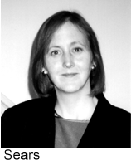 Elizabeth Sears (associate professor, history of art) will work on “Narrative and Non-narrative Imagery in the 12th Century.” This project examines 12th-century pictorial presentations of biblical texts that not only describe the deeds of Christ (gesta), but also “transcribe” his spoken words (dicta). She will be looking specifically at narrative images of the delivery of the Sermon on the Mount and at the non-narrative cycles incorporating the sermon’s opening verses, the beatitudes. She will be the Dean’s Distinguished Faculty Fellow.
Elizabeth Sears (associate professor, history of art) will work on “Narrative and Non-narrative Imagery in the 12th Century.” This project examines 12th-century pictorial presentations of biblical texts that not only describe the deeds of Christ (gesta), but also “transcribe” his spoken words (dicta). She will be looking specifically at narrative images of the delivery of the Sermon on the Mount and at the non-narrative cycles incorporating the sermon’s opening verses, the beatitudes. She will be the Dean’s Distinguished Faculty Fellow.
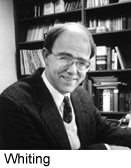 Steven Moore Whiting’s (assistant professor, music history and musicology) scholarly specialties include Beethoven, Satie and French popular musi c. As the Hunting Family Faculty Fellow, he will work on “Variation as Narrative: Case Studies from Beethoven.” Whiting believes that by restoring variation texts to their original contexts, and by judiciously applying modern theoretical insig hts to their interaction, it may become possible to “appreciate classical variations as narrative wholes rather than as musical fashion shows in which simple tunes are tricked out in meretricious pianistic finery.”
Steven Moore Whiting’s (assistant professor, music history and musicology) scholarly specialties include Beethoven, Satie and French popular musi c. As the Hunting Family Faculty Fellow, he will work on “Variation as Narrative: Case Studies from Beethoven.” Whiting believes that by restoring variation texts to their original contexts, and by judiciously applying modern theoretical insig hts to their interaction, it may become possible to “appreciate classical variations as narrative wholes rather than as musical fashion shows in which simple tunes are tricked out in meretricious pianistic finery.”
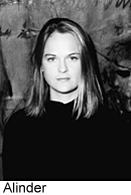 Jasmine Alinder (history of art) is analyzing the social and historical consequence of Japanese American internment by comparing 1940s photographs by Ansel Adams and Dorothea Lange with ones taken in the 1990s by Toyo Miyatake and Patrick Nagatani. Her dissertation, “Out of Site: The Photographic Representation of Japanese American Internment,” will shed light on the construction of 20th-century Japanese American identity and the difficult cultural enterprise of memory recuperation. Alinder will be the Hunting Family Graduate Student Fellow.
Jasmine Alinder (history of art) is analyzing the social and historical consequence of Japanese American internment by comparing 1940s photographs by Ansel Adams and Dorothea Lange with ones taken in the 1990s by Toyo Miyatake and Patrick Nagatani. Her dissertation, “Out of Site: The Photographic Representation of Japanese American Internment,” will shed light on the construction of 20th-century Japanese American identity and the difficult cultural enterprise of memory recuperation. Alinder will be the Hunting Family Graduate Student Fellow.
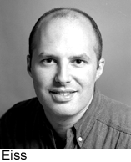 Paul Eiss (Interdepartmental Program in Anthropology and History) will work on “Slavery, Liberty, and the Hunt: Forest and Farm in Yucatan.” While he conducted archival and ethnographic research for his dissertation in 1995-96, Eiss encountered and collected diverse accounts of the enslavement and liberation of Mayan hacienda workers. These tales were drawn from many people and they took many forms, from propaganda to poetry, and from court cases to theater plays. At the heart of his study, he says, are “the power of story-telling and the construction of the archive itself.”
Paul Eiss (Interdepartmental Program in Anthropology and History) will work on “Slavery, Liberty, and the Hunt: Forest and Farm in Yucatan.” While he conducted archival and ethnographic research for his dissertation in 1995-96, Eiss encountered and collected diverse accounts of the enslavement and liberation of Mayan hacienda workers. These tales were drawn from many people and they took many forms, from propaganda to poetry, and from court cases to theater plays. At the heart of his study, he says, are “the power of story-telling and the construction of the archive itself.”
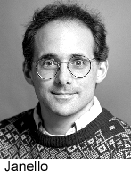 Mark Janello (music composition and theory) is studying the music of early 17th-century composer Girolamo Frescobaldi. His dissertation, “Reclaiming the Distant Present: Keyboard Works of Frescobaldi,” focuses on artists working in “transitional” periods, artists often measured more by their later influence than by their importance to their contemporaries. A harpsichordist, Janello plays in the early music quartet “E17.” He will hold the Director’s Graduate Student Fellowship.
Mark Janello (music composition and theory) is studying the music of early 17th-century composer Girolamo Frescobaldi. His dissertation, “Reclaiming the Distant Present: Keyboard Works of Frescobaldi,” focuses on artists working in “transitional” periods, artists often measured more by their later influence than by their importance to their contemporaries. A harpsichordist, Janello plays in the early music quartet “E17.” He will hold the Director’s Graduate Student Fellowship.
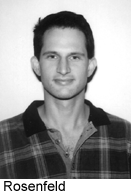 David Rosenfeld (Asian languages and cultures) specializes in modern Japanese literature. His project, “The Politics of Memory,” examines how Japanese writers and literary works popular during World War II were dealt with in the postwar period. He probes most closely the work of Hino Ashihei, Japan’s most popular wartime writer, and one of few who refused to repudiate his wartime activities after the war had ended . Rosenfeld will be the first holder of the Rackham Dean’s Graduate Student Fellowship.
David Rosenfeld (Asian languages and cultures) specializes in modern Japanese literature. His project, “The Politics of Memory,” examines how Japanese writers and literary works popular during World War II were dealt with in the postwar period. He probes most closely the work of Hino Ashihei, Japan’s most popular wartime writer, and one of few who refused to repudiate his wartime activities after the war had ended . Rosenfeld will be the first holder of the Rackham Dean’s Graduate Student Fellowship.
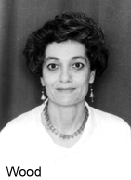 Leela Aditi Wood (history of art) is exploring the role that narrative, especially visual narrative, plays in religion, in politics, and in the heavily imbricated relationship between the two. Her dissertation, & quot;Seeing the Buddha’s Lives: Visual Narrative and its Religious Implications,” centers on Cave 17, a fifth-century cave of the Buddhist monastic site of Ajanta. She sees/reads the cave as an architectonic whole, in dialogue with its most famous l iterary counterpart, Aryasura’s Jatakamala
Leela Aditi Wood (history of art) is exploring the role that narrative, especially visual narrative, plays in religion, in politics, and in the heavily imbricated relationship between the two. Her dissertation, & quot;Seeing the Buddha’s Lives: Visual Narrative and its Religious Implications,” centers on Cave 17, a fifth-century cave of the Buddhist monastic site of Ajanta. She sees/reads the cave as an architectonic whole, in dialogue with its most famous l iterary counterpart, Aryasura’s Jatakamala

